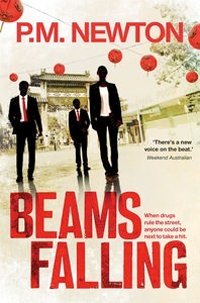
Beams Falling easily could be labeled a police procedural. It’s an easy mistake to make considering the author spent 13 years in the New South Wales police force, working Drug Enforcement, Sexual Assault and Major Crime in and around Sydney. But this is not a police procedural, it’s a novel about how police procedure falls apart when met with real police, real criminals and real drugs.
Set in 1993, shortly after the events of Newton’s first novel The Old School, Detective Nhu ‘Ned’ Kelly is recovering from being shot on the job. Eager to get back to work, but needing to prove she is physically and mentally up to the task, the police doctor hands her a lifeline: restricted duties. This turns out to mean she’ll be the token Asian face in Task Force Acorn, a special team whose vague objective is to clean up Cabramatta, an outer western suburb that’s home to 10,000 refugees from the Vietnam War.
The streets of Cabra, or Vietnamatta as it’s otherwise known, are run by gangs and the ra choi, lawless runaways who have ‘gone out to play’. Before long Ned sees them at work – on her first day in Cabramatta a schoolboy is shot in broad daylight. In witness interviews Ned’s questions are met with silence and fear. The locals know who runs the streets, and they treat the police with suspicion.
While tied to her desk, limited to interviewing school children and struggling with a database full of identical names, Ned searches for a way to link the schoolboy’s murder to the drugs that flow through Cabra and out into the rest of Sydney. Then there’s the matter of a second murder in a crowded pool hall. And, through it all, she struggles to find a link between the gangs of Cabramatta and the murder of her parents.
The theme of family keeps coming back. The police are a family, where everyone looks after each other. But like every family there’s infighting, jealousy and the ever-present scent of betrayal. On the other side are the 5Ts, the main gang active in Cabramatta, from the Vietnamese phrase tuổi trẻ thiếu tình thương – which means ‘young people wanting of love’. On both sides of the law there are families falling apart, and doing what they can to get by in Cabramatta, where the immigrant dream goes to die.
Where race is a central issue it’s very easy to either fall into old stereotypes, or on the other hand to brush over reality. Newton does neither. Her novel depicts racial issues in an unsentimental and authentic way, and paints a picture of a dark chapter in Australia’s recent history – one of multiculturalism’s most high profile failures.
Though centred on a murder investigation, Beams Falling feels more like noir than police procedural. In fact, the title comes from a line in The Maltese Falcon – “he adjusted himself to beams falling, and then no more of them fell and he adjusted himself to them not falling.” Ned herself is a classic noir character – a hard-drinking, broken cop, trying to adjust to what she’s been handed.
Ned struggles with a culture and a town she doesn’t understand which is full of suspicion. From the beginning she’s bound to fail, and it can be hard to believe she keeps coming back. Ned is broken – merely holding a gun sends her into panic, she’s unable to trust any of her colleagues, and during the investigation she makes several near-fatal errors. But it all goes back to falling beams and she adjusts in the only way she can.
I began Beams Falling without knowing it followed on from PM Newton’s first novel, which left some holes in the plot, however it works well enough as a stand-alone book. It’s a compulsive, shocking and insightful read, shining a light on trauma and recovery. It’s also a character-driven crime novel, with both the police and the criminals exposed, warts and all. The most interesting part of Beams Falling is where the line becomes fuzzy, where the police turn criminal and the criminals have their own sense of justice. Beams Falling cuts deep into the heart of race and crime in the Western world, and stays with you long after finishing.
Pengiun
Kindle/Print/iBook
£5.49
CFL Rating: 5 Stars









